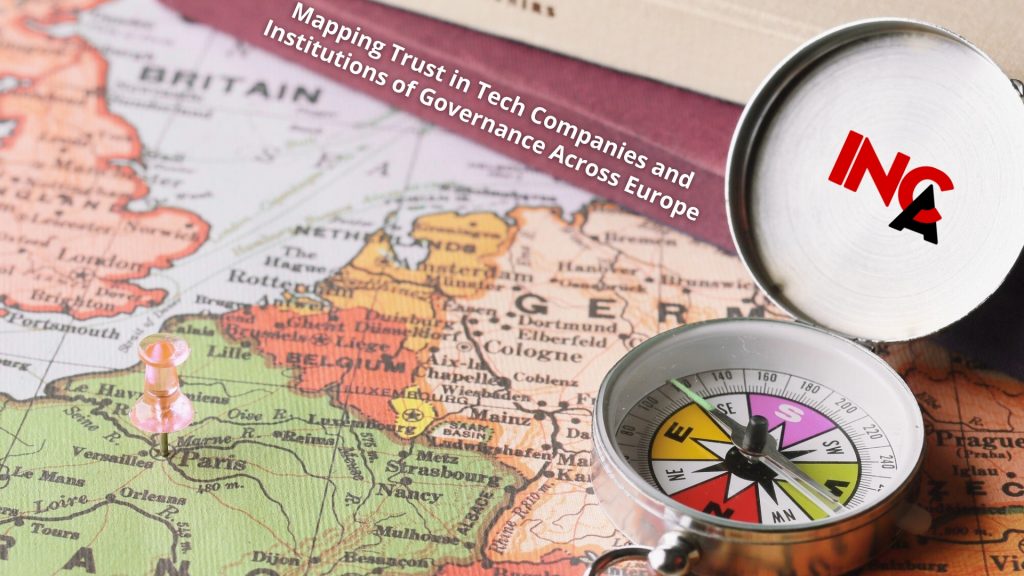
Mapping Trust in Tech Companies and Institutions of Governance Across Europe
As tech companies increasingly shape communication, information flows, and even societal
structures, public trust in technology companies is no longer a purely commercial matter—it has
profound political implications. Comparing trust in major tech firms with trust in public
institutions offers valuable insights into how citizens perceive authority, accountability, and
legitimacy in contemporary Europe.
The INCA project’s recent analysis examines trust in five major tech
companies—Facebook/Meta, Amazon, Apple, Google, and Microsoft (GAFAM)—alongside
national governments, parliaments, legal systems, and the European Parliament across 15
European countries. The findings highlight significant variations both between companies and
across regions. The analysis is based on an original survey conducted in the framework of the
INCA project in fall 2024 in 15 European countries. The dataset, “Public Perceptions of Big
Tech corporations in Europe” (Big Tech survey) focuses on public perceptions of Big Tech
companies in 15 European countries, including Belgium, Denmark, Estonia, Finland, France,
Germany, Hungary, Ireland, Italy, Netherlands, Poland, Portugal, Slovakia, Spain, and Sweden.
The dataset contains responses from at least 1500 individuals from each country, resulting in
22,618 respondents in total.
Trust in Big Tech:
- Facebook/Meta emerges as the least trusted company, with an average score of 4.73/10,
and consistently ranks lowest in 12 of 15 countries. Distrust is especially pronounced in
Northern and Central Europe. - Amazon follows, averaging 5.34/10. While distrusted in much of Northern Europe, it
enjoys relatively high trust in Southern Europe, particularly Spain and Italy. - Apple receives moderate trust levels (5.71/10), generally ranking third across countries.
- Google is the second most trusted firm, scoring 5.98/10, with strong ratings in Southern
and Eastern Europe. - Microsoft stands out as the most trusted tech company, with 6.25/10, leading in 13 out of
15 countries.
Regional differences are clear: Northern and Central European countries show lower trust in
tech, while Southern and Eastern Europe display higher levels.
Across national institutions, governments rank lowest (4.59/10), followed by parliaments
(4.99/10), while legal systems (5.19/10) are the most trusted. Nordic countries stand out with
comparatively high institutional trust, while Eastern Europe records the lowest. The European
Parliament averages 4.99/10, with Portugal, Denmark, and Spain at the top, and Poland and
Slovakia at the bottom.
A striking finding is that in 10 out of 15 countries, citizens place more trust in GAFAM than in
their domestic institutions. Hungary and Slovakia show the largest gaps. In contrast, Nordic
countries—particularly Denmark, Finland, and Sweden—display the reverse pattern, with
stronger trust in their public institutions.
Interestingly, the European Parliament is trusted more than tech companies only in the Nordics,
while in most other countries, GAFAM enjoys higher trust levels.
The study also examines whether trust in tech companies aligns with trust in institutions. The
correlations with domestic institutions are weak (0.20–0.39), suggesting citizens treat these
domains separately. By contrast, correlations with the European Parliament are strong (up to 0.85
in Germany), indicating that trust in GAFAM and supranational governance often go hand in
hand.
These findings suggest that tech companies may be increasingly seen as alternative or even
competing sources of legitimacy, particularly in countries with weak institutional trust. While
this does not necessarily indicate a direct substitution, it highlights the fragmented nature of trust
across Europe. The stronger association between trust in GAFAM and trust in the European
Parliament underscores how both actors may be perceived as forward-looking and less tied to
national political divides.
Yurii Kondratyk, University of Tartu
Share on Facebook Share on Twitter Share on Pinterest